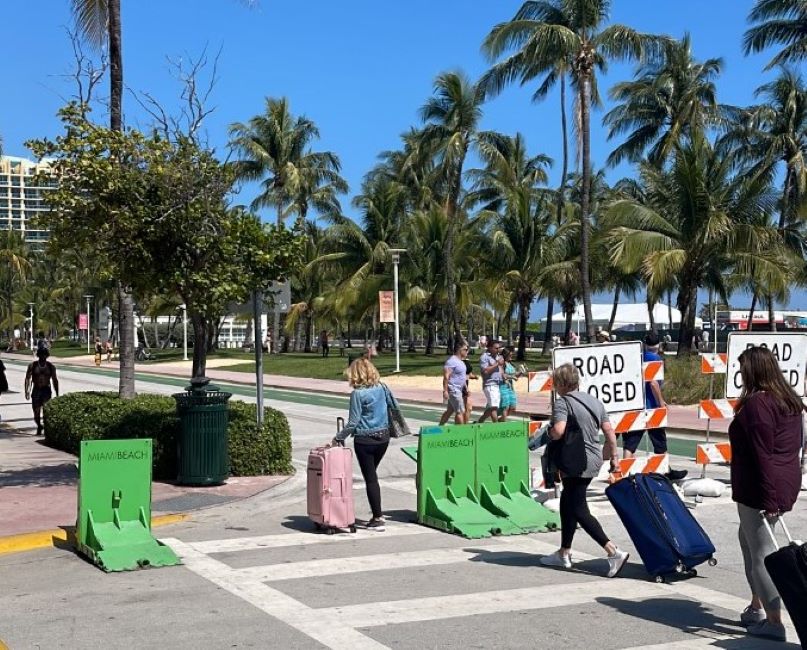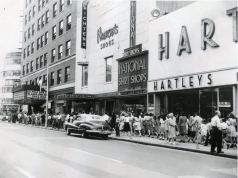A closed block on Ocean Drive continues to create tension among residents, professionals and tourists in Miami Beach. Owners of the seven hotels and one restaurant from 13th Street to 14th Place are celebrating that the street front has become a pedestrian zone. Meanwhile, those who own hotels, restaurants or live on the surrounding streets complain about an increase in traffic on other streets and the devaluation of their property.
Para leer este artículo en espñol, haga clic acá.
The Caplin News has investigated how an urgent resolution by the City of Miami Beach, stated as “temporary” but now three years later, favors some and harms others.
“This is a nightmare because of the traffic congestion and increased insecurity resulting from this measure,” says Mitch Novick, owner of the Sherbrooke All Suites Hotel, located on Collins Avenue four blocks from the pedestrian zone.
After the first six months of confinement during the pandemic, the city secured a temporary permit from the county to make Ocean Drive a pedestrian zone to revive tourism. As of October 2022, the area from 13th Street to 14th Place remained closed, although the city allowed vehicular traffic along the remainder of Ocean Drive.
In addition to closing the street to cars, the city of Miami Beach added two-way bike lanes, booked outdoor concerts and added other activities that it hosts every weekend on that pedestrian block.
Jonathan Plutzik, owner of the Betsy Hotel and member of the Ocean Drive Association, advocates for these changes and has publicly asked the community to support the project and contact their commissioners to make it permanent. The hotels on the street have reached agreements, sharing garages and resources, to facilitate the ingress and egress of their passengers.
However, the Miami-Dade County Department of Transportation and Public Works (DPTW) has not given the “green light” to make the pedestrian zone permanent. It claims that it causes vehicular congestion, restrictions due to the narrowness of the back alley that receives too much traffic and also safety issues from the surrounding streets.
The city waited until the March 3, 2023 deadline to respond to this refusal with a counterproposal. It proposes to allow vehicles to access Ocean Drive at 14th Place from 6 to 11 a.m. from Monday to Saturday. The proposal aims to have a team in place that will allow traffic monitoring and safety, and it will react to any problems that arise.
But when it describes the reaction of the residents, it only mentions those who live on the pedestrian block.
Meanwhile, several guests of nearby hotels, such as the Netherland and Cavalier hotels, now have to get off at one of the perpendicular streets and carry their luggage to the entrance of their hotels.

“The Uber dropped us off two blocks away… my mom, a 70-year-old woman, can’t walk that far. It’s definitely very uncomfortable (…), how crazy,” says Claudia Portilla, an Argentine tourist who traveled accompanied by her two children and her mother.
Novick says that the ban on driving through that area deteriorates the quality of life of its guests and surrounding residents. Moreover, he adds, the decision by the city, a public agency, should protect everyone equally, but now “benefits only those hotels and businesses that are within the pedestrian perimeter.”
Finally, he believes that the concerts and events organized by the city represent an improper use of public funds: “They are paying for this project with taxpayers’ money. It’s not fair,” Novick said.
For this reason, Miami Beach-based sociocultural anthropologist Ariana Reguant explains that the city needs to be more balanced.
“The problem is that building a fortress may serve to protect those who live inside, but in a dense city like Miami, success is not measured based on such a small space. Moreover, if one [area of the] city receives disproportionate resources, it not only generates great inequity but also nonconformity, which exacerbates the problem,” argues Reguant.
While the City of Miami Beach awaits the county’s response to its proposal, the street will continue to be closed to vehicular traffic. However, it is a “temporary” closure, for which it does have a permit, even though it has been in place for more than three years.































